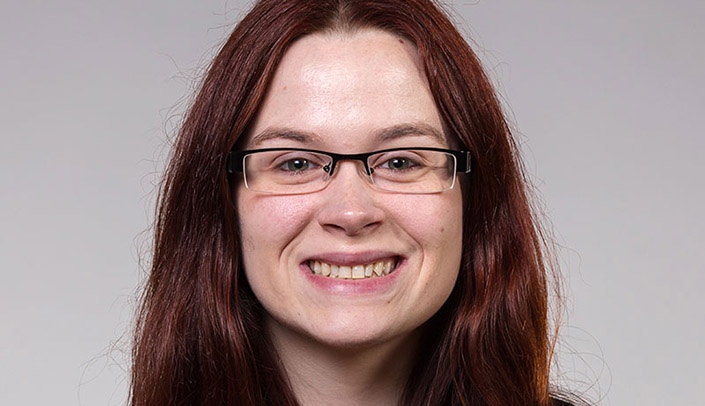Kirstie Bash, PhD, has joined the UNMC College of Medicine in the new position of director of student assessment.
“Her role is to work closely with phase, course, and clerkship directors, as well as with other members of the faculty and administration, to ensure that assessment and evaluation measures of students are consistently applied and are tightly linked to the college’s educational goals and objectives,” said Geoffrey Talmon, MD, associate dean for medical education at the college.
Dr. Bash, who received her PhD in educational psychology from the University of Nebraska-Lincoln, said that the college already has a solid system of assessment in place, and she will be working with college faculty and leaders to see where methods can be improved and refined.
“My background is in both qualitative and quantitative methods, and particularly identifying when to use which methods and in which contexts,” Dr. Bash said. “We want to align the methods we’re using with our objectives, both at the course level and program level. That is my area of expertise and passion.”
Dr. Bash sees herself as a facilitator, allowing faculty and staff to focus on education.
“Any time that you’re dealing with assessment mapping and maintaining a comprehensive system of assessment, it’s a long-term iterative process with a lot of moving pieces,” she said. “Having a person who can be dedicated to managing the system from a methods standpoint will allow faculty and staff to focus on their passions and their interests.”
Initially, she will be leading the Phase One exam review committee, reviewing and identifying which exam questions in Phase One need to be revised to better meet college objectives.
Coming into the role, Dr. Bash said her other goals are:
- To collaborate with faculty on their projects related to assessment;
- To assist with data analysis of assessment data;
- To ensure our assessments align with AAMC EPA standards; and
- To identify where we can better prepare medical students in their education.
Dr. Bash also spoke of the importance of using qualitative as well as quantitative data.
“I think of quantitative data as the ‘what’ and qualitative data as the ‘why’ or ‘how.’ Having rich data, like qualitative data, lets students’ voices be heard … especially in assessment, that piece is critical to understanding their experiences and how to improve our assessment of those experiences in the long term.”
